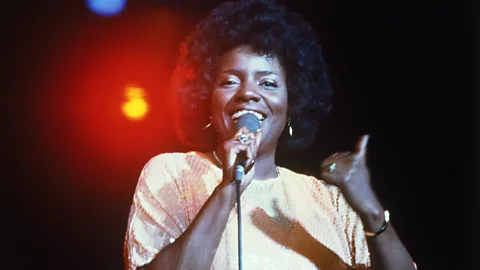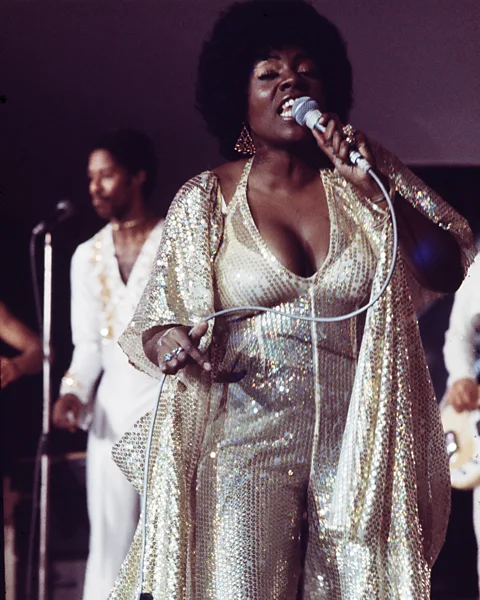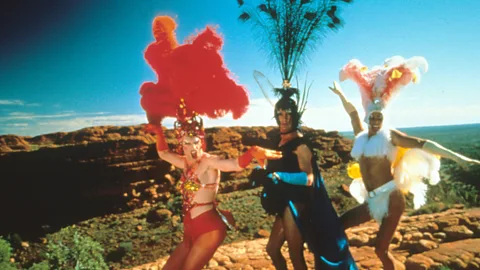By Nick LevineFeatures correspondent

 Alamy
Alamy
It may be considered the greatest post-relationship pep-up anthem – but that’s not how it originated. As a new documentary about Gaynor is released, here is a closer look at the song.
From The Beatles to Taylor Swift, pop songwriting has always relied on catchy hooks to ensnare listeners – sometimes it’s a sticky musical refrain; sometimes a pithy lyric. But few songs reel you in quite as confidently as Gloria Gaynor’s 1978 disco masterpiece I Will Survive. It’s a song so synonymous with the singer, now 80, that it provides the title of a new documentary film about her life, Gloria Gaynor: I Will Survive. “That song is my story,” Gaynor said in a recent interview with The Independent.
More like this:
– The 1970s club that ushered in a new rock era
And you can definitely hear this in her richly emotive vocal performance. When Gaynor sings “at first I was afraid, I was petrified” after a melodramatic piano flourish, it’s incredibly evocative but also slightly misleading. Because a few bars later, Gaynor reveals the song’s true message is not one of fear, but of strength, empowerment and resilience. “But then I spent so many nights thinkin’ how you did me wrong,” she sings with glorious force and fervour. “And I grew strong and I learned how to get along.”

 Getty Images
Getty Images
By the time the beat kicks in, we’re fully invested. “I think the reason it’s such a beloved record is that the disco grooves are just so driving and metronomic that it absolutely launches itself after that initial wafty beginning,” says Oliver Keens, a disco DJ and columnist for The Independent. Bestley, a DJ and artist with a deep-rooted knowledge of disco, house and soul music, points out that I Will Survive’s midtempo pace of 117 beats per minute (bpm) is a “great speed for extended periods of dancing” because it elevates your heart rate in a similar way to light exercise.
The song’s influence
I Will Survive isn’t just a beloved disco record, but also a landmark one. In 2016, it was listed in the National Recording Registry, a catalogue of sound recordings “deemed culturally, historically or aesthetically significant” by the Library of Congress. Despite being 45 years old, the song itself retains a generation-spanning appeal. Gen Z icon Harry Styles covered it during his 2022 Coachella headline set, while Madonna, one of pop’s great survivors, is singing it on her career-spanning Celebration Tour. Miley Cyrus’s shimmering 2023 hit Flowers, which was recently named record of the year at the Grammys, doesn’t formally sample I Will Survive, but does contain echoes of its dance floor defiance. When Flowers was released last year, Gaynor said approvingly that it “carries the torch of empowerment”. Bestley says that because the two songs “mix very well together”, they have been pairing Flowers and I Will Survive in their DJ sets for “a peak moment”.
Though Gaynor scored other hits during the disco era, most notably with her driving 1974 cover of the Jackson 5’s Never Can Say Goodbye, I Will Survive has become her undeniable signature song. The new documentary film about her life and career, Gloria Gaynor: I Will Survive, which played in US cinemas for one day only on 13 February and will hopefully get a wider release at some stage soon, proves she has definitely earned that epithet.
The film tracks the singer’s dogged attempts to make her first ever gospel album in her mid-70s – despite being told by her manager that “no one wants” it from her – and looks back at the many personal obstacles she has overcome. These include a challenging 26-year marriage to her former manager, Lynwood Johnson, whom she divorced in 2005 and describes in the film as a “woman magnet”, and the murder of her sister in 1995. Gaynor also speaks about being sexually molested on several occasions while growing up in Newark, New Jersey: by her mother’s partner when she was 12, and again at 17 by her boyfriend’s cousin.
It’s a song about empowerment and self-realisation, and because the lyrics don’t mention the gender of the singer or the person being sung to, anyone can identify with it – Bestley
Gaynor’s determination to pivot towards gospel paid off when the resulting album, 2019’s Testimony, won a Grammy the following year. Since then, she has returned to dance music with 2021’s Can’t Stop Writing Songs About You, a slinky collaboration with Kylie Minogue, and competed on The Masked Singer in the US. After being unveiled as the mystery voice behind a costumed character called “Mermaid”, she sang I Will Survive – what else? – as her encore song.
Gaynor began singing professionally in the mid-1960s as a member of jazz-R&B band The Soul Satisfiers, but only achieved international success after going solo and switching to disco in the 1970s. When I Will Survive climbed to number one on the US and UK singles chart in 1979, it became her biggest hit as well as the most enduring. In 1993, Gaynor’s I Will Survive returned to the UK top 10 after remixer Phil Kelsey gave it an elegant refresh for the house music era.
Gaynor’s original disco version remains definitive to this day, but over the years, dozens of artists have put their own stamp on I Will Survive. In 1996 and 1997, three very different cover versions charted in various territories: Diana Ross’s dance-pop remake, a classy ballad reimagining by R&B singer Chantay Savage, and a jangly alt-rock remodel by Cake. In 2008, Gaynor named Cake’s cover her “least favourite” because the California band “used profanity” in their lyrics.

 Getty Images
Getty Images
The classic status and sheer ubiquity of Gaynor’s original version proved “daunting” to DJ-producer Eric Kupper when he was asked to remix it in 2020. “I wanted to bring something fresh to the table without reinventing the wheel,” Kupper tells BBC Culture. Each of his three I Will Survive remixes gives the track a contemporary club update that’s elegant and respectful, but Kupper says he “took more chances” in his dub mix, which chops and loops Gaynor’s vocals in daring ways. “There can be stigma from some DJs when it comes to playing such a well- known song,” Kupper says. “But I was pleased because I had underground DJs contacting me to say that my remixes, especially the dub [version], gave them a reason to put it in their sets again.”
How it started life
Because I Will Survive is now so embedded in global pop culture – a clip of tennis champion Novak Djokovic singing it on a French TV show in 2007 went viral earlier this month – it is surprising to note that it was initially intended as a throwaway. When it was recorded by Gaynor in 1978, it was earmarked as the B-side to a then-popular song called Substitute, which had recently been a hit for South African rock band Clout. Gaynor’s label Casablanca asked songwriter Freddie Perren to produce a disco remake, and he said yes on the proviso that he could also produce its B-side. When he showed Gaynor the lyrics to I Will Survive, a song he had written with fellow songwriter Dino Fekaris, she immediately spotted its potential. “I said that this is a timeless lyric,” the singer told NPR recently. She also recalled saying to her collaborators: “http://www.bbc.com/”How can you put that on the B-side?’ They said, ‘Well, that’s the deal we made.”http://www.bbc.com/”
Gaynor was so sure that I Will Survive deserved a proper shot that she gave it to Richie Kaczor, a DJ at New York’s most influential nightclub, Studio 54. “The audience immediately loved it,” Gaynor told Forbes in 2020. “I thought, ‘This is a hit song. New York audiences don’t immediately love anything.’ So I gave the DJ a stack of the record to give to his DJ friends.” Soon enough, I Will Survive was proving so popular on dance floors that Gaynor’s label made it an A-side and it quickly scaled the charts. As I Will Survive was dominating New York’s disco scene, it was also being embraced 50 miles away on Fire Island, a beach resort popular with the LGBTQ+ community. According to the Fire Island Pines Historical Preservation Society, it “became one of the quintessential anthems for Gay Pride” in 1979 and has “held strong as a favourite of gay men everywhere”.
It’s the hi-hats running through I Will Survive that are the absolute star. They’re like the pulse of the song’s protagonist as they run from the turmoil of their past – Olive Keens
More than 40 years later, in 2022, Time Out placed it top of their list of “50 gay songs to celebrate Pride all year long“. It’s easy to see why I Will Survive, a song with an innate sense of drama, has always resonated with LGBTQ+ listeners. Defiant lines such as “Did you think I’d crumble? Did you think I’d lay down and die?” really strike a chord with anyone who has to fight for their right to live how they want to.
“It’s a song about empowerment and self-realisation, and because the lyrics don’t mention the gender of the singer or the person being sung to, anyone can identify with it,” Bestley says. I Will Survive may be genderless, but because the most famous version is sung by Gaynor, it has also been embraced as a female empowerment anthem. It’s the story of someone rising above the anguish caused by their callous ex and saying: “I’m not that chained up little person still in love with you.”
This universal quality could also be rooted in the fact that I Will Survive is a gutsy break-up song inspired by a professional – rather than romantic – setback. Fekaris has said he wrote it after being fired from his staff writer job at Motown Records. The lyrics are clearly about moving on following a failed relationship, but they contain a broader sense of raw resilience, and Gaynor poured a misfortune of her own into her roaring vocal performance. “I’d been on stage and fallen backwards over a monitor and ended up in hospital, paralysed from the waist down, but I knew I could survive,” she told The Daily Telegraph in 2017.

 Alamy
Alamy
I Will Survive has certainly proved adaptable over the years, appearing in films about drag queens (1994’s The Adventures of Priscilla, Queen of the Desert) and a fictional NFL strike (2000’s The Replacements). Kupper believes his 2020 remixes were “well timed” because its “message of empowerment” chimed during the pandemic, when a video of Gaynor washing her hands to the song went viral.
However, Kupper also believes I Will Survive has lasted because of its sheer quality. “It’s an excellent, well-crafted song, both musically and lyrically, and [Gaynor] performs it with great passion,” he says. Her voice has always shimmered with incredible sincerity, which is why her 1983 disco cover of I Am What I Am – from the Broadway musical La Cage Aux Folles – has also been embraced as an LGBTQ+ anthem.
For Keens, it’s the “hi-hats running through I Will Survive that are the absolute star”. He likens their rhythms to “the pulse of the song’s protagonist as they run from the turmoil of their past”. Whether you’ve been in this predicament or not, there is something ineffably rousing and relatable about Gaynor”s disco anthem. It’s a song that has your back whenever you need to dig deep and say: “Oh no, not I – I will survive.”
If you liked this story, sign up for The Essential List newsletter – a handpicked selection of features, videos and can’t-miss news delivered to your inbox every Friday.
If you would like to comment on this story or anything else you have seen on BBC Culture, head over to our Facebook page or message us on Twitter





